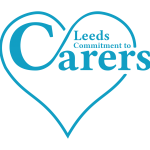Introducing Leeds Commitment to Carers: “Making Leeds the best city for carers”
Leeds City Council has a bold ambition to be the best city for health and wellbeing in the UK. Unpaid carers are crucial both to our communities and to the sustainability of health and social care in Leeds. If we are to be the best city for health and wellbeing, we need to be the best city for carers!
That means being the best at identifying carers, the best at recognising and valuing the contribution that carers make, the best at promoting carers own health and wellbeing and the best at supporting working carers.
We all have our part to play. By taking action to demonstrate your own commitment you are taking a positive step in making Leeds the best city for carers. If you or your organisation are ready pledge your commitment today, complete this pledge form.
Carers Leeds is part of the Leeds Carers Partnership; a city wide group of organisations and individuals that champions the needs of carers and aims to influence the way that services are planned and delivered. To find out more about the group, please follow this link. To find out more about Leeds Commitment to Carers, please see below.
What is a carer?
A carer is a person of any age who helps to look after a relative, neighbour or friend who could not manage without their help because of physical or mental ill-health, disability, sensory impairment or substance misuse.
There are around 6 million carers in the UK and the support that they provide is unpaid – they should not be confused with paid care workers.
“Carers provide the bulk of care in our country. Three in five of us will become carers at some point in our lives. Without carers our NHS and social services would be overwhelmed. But many carers pay a heavy price for their caring role in both their health and their wealth.”
Rt Hon Paul Burstow, Care Act for Carers – One Year On (Carers Trust: July 2016)
What do carers do?
Facts about carers in Leeds
Impact of caring on health and wellbeing
There is lots of evidence to suggest that carers often experience negative health, social and financial consequences as a result of caring, for example:
Why supporting carers is important
If Leeds is the best city for carers…
Our aim is that carers will say:
Organisations and service providers will show how they:
Carers Leeds supports unpaid carers:
Carers Advice Line: 0113 380 4300
Carers Advice Email: advice@carersleeds.org.uk



